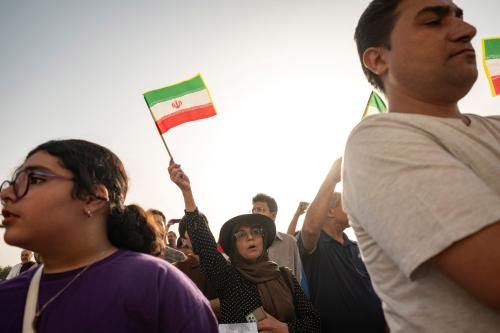First this week, let us draw your attention to the newly published Iran-focused edition of the Cairo Review. It features articles including a look at the challenge facing Hassan Rouhani by Nader Hashemi, a profile of Supreme Leader Ali Khamenei by Nazila Fathi, and a discussion of the difficulties that have faced the Iran-Pakistan-India Pipline by Reza Sanati, along with contributions from such figures as Abdolkarim Soroush and Bijan Khajehpour.
As with most weeks, the nuclear issue was the subject of a few interesting pieces this week, ending with today’s reports in the New York Times of an attempt by Iraq to facilitate direct Iranian-American talks. In the same publication, Cliff Kupchan added his voice to those calling for the United States to push for a breakthrough in talks quickly after the inauguration of Hassan Rouhani. Former Jordanian Foreign Minister Marwan Muasher made the case in the National Interest that the negative consequences of a military strike on Iran would be so great that, at least for now, the United States should take the military option off the table.
In human rights issues this week, noted lawyer and activist (and former Saban Center Visiting Fellow) Mehrangiz Kar wrote a piece about a famous picture that has been buzzing around the internet recently, featuring dissident filmmaker and writer Mohammad Nourizadeh kissing the feet of a young member of the persecuted Baha’i minority. In addition, the footage of Australia informing Iranian asylum seekers who had just made a perilous sea journey that none of them would have any chance to stay there – footage publicized by Australia’s Labour government in order to discourage future migrants from Iran and elsewhere – has drawn scrutiny to the harsh new rules enacted by Canberra.
Iran was highlighted in the world of sports as well this week. First, in a nearly comical reminder of the levels to which the Persian Gulf name dispute between Iran and its southern neighbors has sunk, the Wall Street Journal reported that Iranian national team soccer star Javad Nekounam’s lucrative new contract to play for a club in the United Arab Emirates was blocked by Iranian authorities, who did not want the Team Melli captain joining a league newly renamed the Arabian Gulf League. In a more heartwarming but ultimately tragic story, many in Iran and in the mountain-climbing community worldwide were transfixed by the story of three Iranian mountaineers who went missing after completing a daring new ascent of Pakistan’s daunting Broad Peak; Payvand mixed coverage from the Iranian sources to illustrate the complex nature of the Iranians’ pursuit and the difficulties facing Iranian climbers, while an American climber named Scott Powrie, who hiked alongside the Iranian climbers, memorialized their generosity and Iranian hospitality in a moving personal blog post.
Finally, for those who are interested in what role Twitter plays for president-elect Hassan Rouhani – a question I also examined in a look at all the candidates’ social media habits during the presidential campaign – check out an in-depth look written by Garrett Nada at USIP’s Iran Primer.
Enjoy the reading, and have a great weekend!
The Brookings Institution is committed to quality, independence, and impact.
We are supported by a diverse array of funders. In line with our values and policies, each Brookings publication represents the sole views of its author(s).




Commentary
What to Read on Iran This Week: Nuclear Diplomacy, Human Rights, Sports and More
July 26, 2013